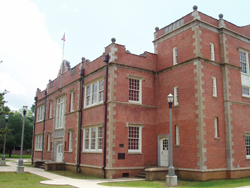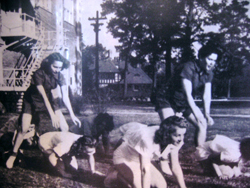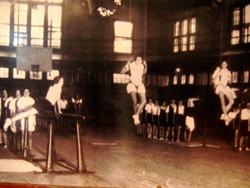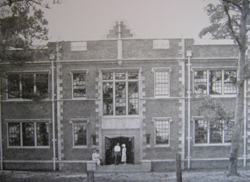
As home to the National Center for Preservation Technology and Training, Lee H. Nelson Hall is now the nation's center for preservation technology research. But, for almost 40 years, the structure served as a classroom building and activity center for female physical education students on the campus of what is now Northwestern State University (NSU). The women's physical education program took over the gym when a newer men's gymnasium was completed in the early
1930's, providing a lifetime of fond memories for the women who had classes
there.
"It wasn't a pretty building, but it was a home away from home for us," said
Dr. Violet (Davion) Shaver, a 1939 graduate who was a member of the physical
education faculty from 1955 until 1978. "The faculty who taught there had a
special interest in each one of us."
And many of those students can't think of the gym without remembering the
faculty member who had the biggest impact on students, Thelma Kyser.
"Mrs. Kyser was the building," said Lou Baxter, a 1941 graduate who later
taught physical education from 1965 until 1980 at Northwestern. "Her program led
to a lot of girls going into physical education."

Kyser,
who taught at State Normal School (now NSU) from 1922 until 1940, was a pioneer
in women's physical education in Louisiana. She established the first academic
major in physical education in Louisiana---the first curriculum in the field for
women.
On the first floor of the building were dressing rooms and a dance studio.
Freshman football players sometimes used one of the dressing rooms. Because of
the building's layout, spectators could look down on games from the track.
"I remember people standing on the railing of the track looking down on the
games," said Shaver. "They would eat parched peanuts and sometimes the shells
would fall on the floor and we'd have to stop the games to clean them up."
"We played volleyball, badminton and basketball and used the track," said Dr.
Colleen Lancaster, a 1948 graduate who was on the health and physical education
faculty from 1956 until 1986. "The balls or the shuttlecock would go up there a
lot and someone would have to go up and get it."
Many students got their first impression of Northwestern when they came to
play in basketball tournaments.
"I played in a basketball tournament at Northwestern when I was in high
school," said Baxter. "There was no chance for women to play basketball in
college at the time. I had a scholarship which would allow me to go anywhere in
the state. I chose Northwestern because, when I was here, everyone was so
helpful and friendly.

My
husband saw me for the first time one day when I was coming out of the gym,"
said Peggy Sibley of Natchitoches, a 1951 graduate of Northwestern who later
married Natchitoches businessman S.T. Sibley II. "I think he spent a lot of time
on his porch on College Avenue."
After more than 30 years of use, the building began to show the first signs of
age. Lancaster asked Northwestern's administration in the late 1950's for a new
floor in the dance studio, air conditioning and new lockers to give the building
a facelift.
But as the university continued to grow, the existing facilities could not
accommodate all male and female students who took physical education classes. In
1970, a new Health and P.E. Majors Building was completed on Tarleton Drive and
the Women's Gym was closed.
"Everything gets old after a while. We were beginning to ask about a new
building with more space," said Lancaster.

Nelson Hall was originally constructed in 1923 and was designed by the architectural
firm of Favrot and Livaudais, the largest in New Orleans at that time. The firm
designed several of the most important buildings in the New Orleans Central
Business District and numerous public buildings around the state.
For almost 30 years the only use for the building was for storage. Plans were
made to convert the building into a museum honoring education in Louisiana, but
organizers were not able to raise the needed funds. In 1984, the building's
architectural significance was recognized when it was placed on the National
Register of Historic Places.

A
new use for the Women's Gym was developed after the National Center for
Preservation Technology and Training (NCPTT) came to NSU in 1992. Rehabilitation
of the structure began in 1997, but disaster struck in November 1997 when a fire
destroyed the interior of the building. Through the efforts of the Natchitoches
Fire Department, the exterior was saved.
NCPTT moved into the building in 2001 and the building was renamed Lee H.
Nelson Hall that November. The National Center for Preservation Technology and
Training uses technology to serve the future of America's heritage through
applied research and professional training.
Since its founding in 1994, NCPTT
has awarded over $5 million in grants for research that advances the use of
science and technology in historic preservation. Working in the fields of
archeology, architecture, landscape architecture and materials conservation, the
Center accomplishes its mission through training, education, research,
technology transfer and partnerships. The Center is located in Lee H. Nelson
Hall on the campus of Northwestern State University in Natchitoches, Louisiana.
For more information about NCPTT, visit the Center's website:
http://www.ncptt.nps.gov/.
This article originally appeared in NCPTT Notes newsletter.